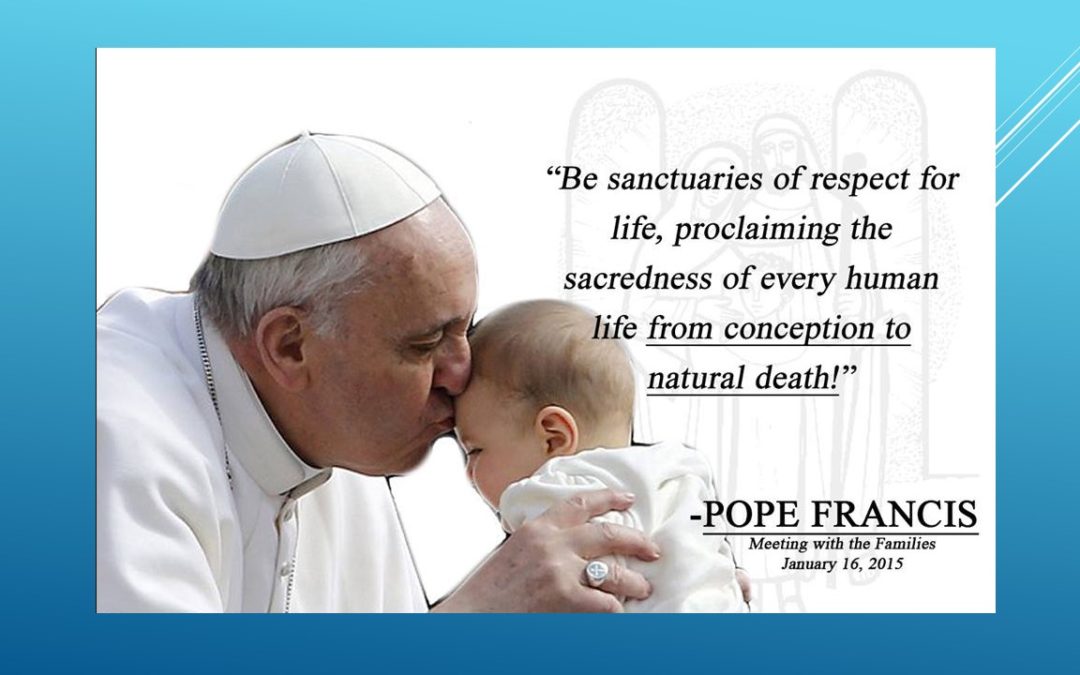
FAUSTO GOMEZ OP
After the election of Pope Francis, many people throughout the world expected profound changes in the Church, in particular on the divisive issue of birth control, including abortion. In a previous piece, the author considered the teaching of the Church on abortion today. In this second text, he presents the specific teaching of Pope Francis on abortion.
According to the secular press and some theologians and social activists, the Church appears to focus more on specific issues of sexual ethics than on concern for social ethics. Be that as it may, it is easy to prove that the Church in most countries is likewise focusing on the problems related to forced poverty. In fact, it is no exaggeration to affirm that as an institution the Church is – with others, but of course – among the first in working really for and with the poor. The face of the Church throughout the world is in general caritas. The teaching of the Church underlines not only her opposition to abortion but also her commitment to social justice and mercy: the social teachings of the Church are definitely pro-poor, and so is unmistakably Pope Francis from his first authoritative text Evangelii Gaudium (2013) to the last, Amoris Laetitia (2016). Needless to say that the Church, that is, members of the Church (priests, religious and lay persons), and many others continue failing regarding the practice of the Church teaching.
Concerns for sexual ethics and for social justice and peace are necessarily connected: Only respect for life can be the foundation and guarantee of the most precious and essential goods of society, such as democracy and peace (John Paul II, EV 101). Pope Benedict XVI says that one cannot separate sexual ethics from social ethics, because the issues are intertwined: Only if human life from conception until death is respected is the ethic of peace possible and credible; only then may nonviolence be expressed in every direction; only then can we truly accept creation and only then can we achieve true justice (Meeting with Bishops from Switzerland: November 9, 2006; cf. Id., Encyclical Caritas in Veritate, 2009, 15). Pope Francis states: This defense (of the Church) of unborn life is closely linked to the defense of each and every other human right. It involves the conviction that a human being is always sacred and inviolable, in any situation and at every stage of development (EG 213). Since the beginning of his pontificate, Pope Francis is focusing on the option for the poor. This option for or commitment to the poor includes necessarily the unborn children, who are the most defenseless. Before his election as Pope, the then cardinal Jorge Mario Bergoglio was, of course, openly against abortion. Likewise, after his election. Cardinal Bergoglio words: The pregnant woman doesn’t carry a toothbrush in her womb or a tumor. Science teaches that from the moment of conception, the new being has all the genetic code. It impressive. It not, therefore, a religious question but clearly a moral one, based on science (Quoted in book Pope Francis. Conversations with Jorge Mario Bergoglio, 2010 and 2012).
Furthermore, Pope Francis proclaims: The first right of the human person is his life; very unborn child, condemned unjustly to be aborted, has the face of the Lord, who before being born, experienced the rejection of the world (Message to International Federation of Catholic Medical Associations; September 20, 2013). Among the vulnerable, who the Church wishes to care with particular love and concern, are unborn children, the most defenseless and innocent among us (EG 213).
Pope Francis has called abortion a symptom of a “throwaway culture” that places too little value on human life. It is “frightful” to think about early pregnancy terminations. It is horrific even to think that there are children, victims of abortion, who will never see the light of day” (cf. Address to Diplomats Accredited to the Vatican, January 14, 2014). The Church cannot be expected to change her position on this question. I want to be completely honest in this regard. This is not something subject to alleged reforms or modernization. It is not progressive to try to resolve problems by eliminating a human life (EG 214). Pope Francis adds: Christ dwelt for nine months in the tabernacle of Mary womb (EG 285).
In an Address to the Italian Pro-Life Movement, Pope Francis affirms: We know it: human life is sacred and inviolable. Every civil right rests on the recognition of the first and fundamental right of life, which is not subordinated to any condition, either qualitative or economic and least of all ideological. The Argentinian Pope adds: For one who is a Christian, this evangelical witness must always be given: to protect life with courage and love in all its phases (April 11, 2014).
On April 25, 2014, Pope Francis spoke to a group of African bishops thus: Abortion compounds the grief of many women who now carry with them deep physical and spiritual wounds after succumbing to the pressures of a secular culture which devalues God gift of sexuality and the right to life of the unborn. Looking at the Child Jesus, my thought is directed to all the children that today are killed or maltreated, including those who will not see the light, robbed of the generous love of their parents, buried by the selfishness of a culture that does not love life (Pope Francis: Urbi et Orbi, Dec. 25, 2014, and Homily, Dec. 24, 2016).
In his Apostolic Exhortation Amoris Laetitia, Pope Francis reaffirms with clear and strong words the Church rejection of abortion: So great is the value of human life, and so inalienable the right to life of an innocent child growing in the mother womb, that no alleged right to one own body can justify a decision to terminate that life, which is an end in itself and which can never be considered property of another human being (AL 83). In his Apostolic Letter Misericordia et Misera (November 20, 2016) closing the Holy Year of Mercy the Pope affirms: wish to restate as firmly as I can that abortion is a grave sin, since it puts an end to an innocent life (MM 12, # 1). This is one side of the coin (true doctrine). The other side (merciful compassion) which completes the picture is worded by Pope Francis thus: “In the same way, however, I can and must state that there is no sin that God mercy cannot reach and wipe away when it finds a repentant heart seeking to be reconciled with the Father (MM 12, # 1). By the way, since November 20, 2016, the grave sin of abortion can be forgiven by every priest (MM 12, # 1).
Pope Francis is also very much concerned with the plight of women who have had an abortion or might be thinking of aborting the child in their womb. He said to the Italian Pro-Life Movement: “I encourage you to do so (to protect life) always with the style of closeness, of proximity: so that every woman feels regarded as a person, heard, received and supported.
The acceptance and practice of abortion introduce us into a tunnel. Sooner or later we will realize that unless we get out of the tunnel, there will be no scape: after abortion, euthanasia, after euthanasia, eugenics of different kinds: the slippery slope of a culture of death. As human beings, as Christians, we can do something against the tide of the culture of death. We may light a candle: you and me, and the other and the other. We are a family, which is a community of life and love. As Christians in particular, we are asked to show priority love to the poor and defenseless. We remember the words that Christ the Lord will hopefully address to each one of us after crossing the passage of death: Come in for what you did to the least of my brothers and sisters you did it to me (cf. Mt, 25:31-46).
May I humbly ask Catholics, my dear brothers and sisters, to please try not to be Cafeteria Catholics: those who among us seem to believe what we like only – what is easy! All of us love and praise to the heavens Pope Francis, but some of us keep quiet perhaps on what we do not like such as his sayings against abortion or against capitalism or against consumerism or against corruption or his insistence on the need of prayer or
As human beings and as believers, we believe in life and justice, in prayer and compassion. We truly believe in faithful, loving and prayerful hope. We strongly believe that tomorrow will be better, because today we try hard to put love in all we do to light a candle for life!
(Published by O Clarim, March 24, 2017)

FAUSTO GOMEZ OP
faustogomezb@yahoo.com
      The Psalmist invites us: Today listen to his (God’s) voice, harden not your hearts! (Ps 95:7-8). Today, not yesterday, not tomorrow! Today, harden not your heart by not listening to God’s voice, that is, by not doing good or by doing evil – by being selfish or envious or unforgiving. These harden our hearts!
      We listen to God’s voice today for today is “the day the Lord has made for us, a day to rejoice and be glad†(Ps 118:24). Today is God’s time for us (cf. Catechism of the Catholic Church, CCC 2659). It is not yesterday: “In last year’s nest there are no birds this year†(Cervantes, Don Quixote de la Mancha). The prophet of Nazareth tells us: “Do not worry about tomorrow: tomorrow will take care of itself. Each day has enough trouble of its own†(Mt 6:34).
      What is the meaning of “today†in the perspective of faith? Today in the Bible means the day of God’s visitation (Lk 12:54). In the Old Testament, “today†is the time for a blessing, for obedience to God, for salvation. Contrarily, it may become – if we harden our hearts – a time for a curse, disobedience, perdition. In the New Testament, we are told, the word “today†is used forty times, half of them in Luke. In the hymn of Zechariah, the Benedictus, we pray to God “to serve him in holiness and justice in his presence, all the days of our life†(Lk 1:75). Jesus is born “today†(Lk 2:11). “Today†this Sacred Scripture is fulfilled,†Jesus says in the Synagogue (Lk 4:21). Jesus tells us that “the Kingdom of heaven is at hand†(Mk 1:14-15), that is, the Kingdom of heaven is “now,†today. “Today†Jesus encounters the sinner Zacchaeus: “Zacchaeus, come down (the sycamore tree); hurry, because I am to stay at your house today†(Lk 19:5). One of the disciples of Jesus wished to follow him later not today: he wanted to take care of his father first. Jesus tells him: “Follow me,†that is not tomorrow but today, not later but now! (Mt 8:21-22). From the Cross, Jesus tells the good thief crucified near him: “Today you will be with me in Paradise†(Lk 23:43).
      Daily we pray: “Give us this day our daily bread.†(Mt 6:11). This petition of the Lord’s Prayer, the Our Father “reminds us that all we have comes from God†(St. Thomas Aquinas). We ask God the Father, Our Father every day to give us the bread of grace, the Bread of the Eucharist (Jn 6:51), the bread of God’s Word (Mt 4:4), and the bread or food this day. “Give usâ€: not only to you and to me, but also to our brothers and sisters, particularly those who have no bread and with whom we have to share our bread. “This petition of the Lord’s Prayer cannot be isolated from the parables of the poor man Lazarus and of the Last Judgment†(CCC, 2831; cf. Lk 16:19-31; Mt 25:31-46).
      Today implies “obedience and abandonment to the plan of God†(Massimo Grilli, 2013). For the Christian, the believer “today†is not just the chronological day, chronos, marked by the calendar but a theological or spiritual day, a Kairos – God’s grace and love. This day, today we listen to God’s voice in our hearts, in our brothers, in his creation. Today we listen to God’s Word, Jesus Christ, God’s Son and our brother and savior. Today, however, is not separated from but linked to yesterday and tomorrow.
      To concentrate on today does not mean to forget yesterday: this day is grounded on our days past. Nor does it mean to forget tomorrow: we are pilgrims on the way to God, and “today is always not yet†(Antonio Machado). “Trust the past in God’s mercy, the present to his love, and the future to his Providence”; as our memory is the present of the past, our hope is the present of the future (St. Augustine). The Eucharist illustrates perfectly the necessary links among yesterday, today and tomorrow: it is memorial of the passion of Christ (yesterday); pledge of future glory (tomorrow), and grace every day (today). Our Christian life is a dynamic tension between the past and the future lived in the present: a journey from the already of the death and resurrection of Christ to the not yet of eternal happiness by living this day faithfully and creatively as God’s creatures and children.
      The poet mystic Kahlil Gibran writes in The Prophet:
Yet the timeless of you is aware of life’s timelessness, and knows;
And knows that yesterday is but to-day’s memory and to-morrow is to-day’s dream.
And let to-day embrace the past with remembrance and the future with longingâ€
      Saint Mother Teresa of Kolkata was asked, “What are your plans for the future?†She answered: “I do not have plans for the future; I only care about today, for today is the day I have to love Jesus.†St. Francis of Sales advises us: “Live one day at a time, leaving the rest in God’s careâ€; “Go along with confidence in divine Providence, worrying only about the present day and leaving your heart in the Lord’s care.†In his Spiritual Diary, Saint John XXIII begins many daily entries with these words: “Only for today…†For the good Pope, “every day is a good day to be born and every day is a good day to die.â€
      As Christians we love today, which is God’s gift. With the example of Christ and the power of the Holy Spirit, we are not afraid today, we do our duty today, we put love in everything we do today, we are compassionate today, we are grateful today, we smile today. When we fail, when we do not hear God’s voice and harden our heart – we are sinners -, then it is the day of repentance and of God’s forgiveness.
       Carpe diem the Romans used to say, that is seize the day, live this day the best you can. For Christians and other believers and non-believers, carpe diem implies fidelity to this day, hopeful and loving fidelity.
      Rooted in faith and hoping for heaven, believers march forward with steps of love. Joyful in hope (Rom 12:12), we march “striving towards the goal of resurrection from the dead†(Phil 3:11), “racing towards the finishing-point†(Phil 3:14), we journey today, every day with steps of love towards the embrace of Jesus the Lord.
      Is today very significant in our life? Indeed, it is! A fruitful day – today -, rooted in yesterday, journeys towards tomorrow by the path of passionate and joyful love of God, of neighbor, of needy neighbor, of creation.
Brother, sister, have a good day.Today!
Â
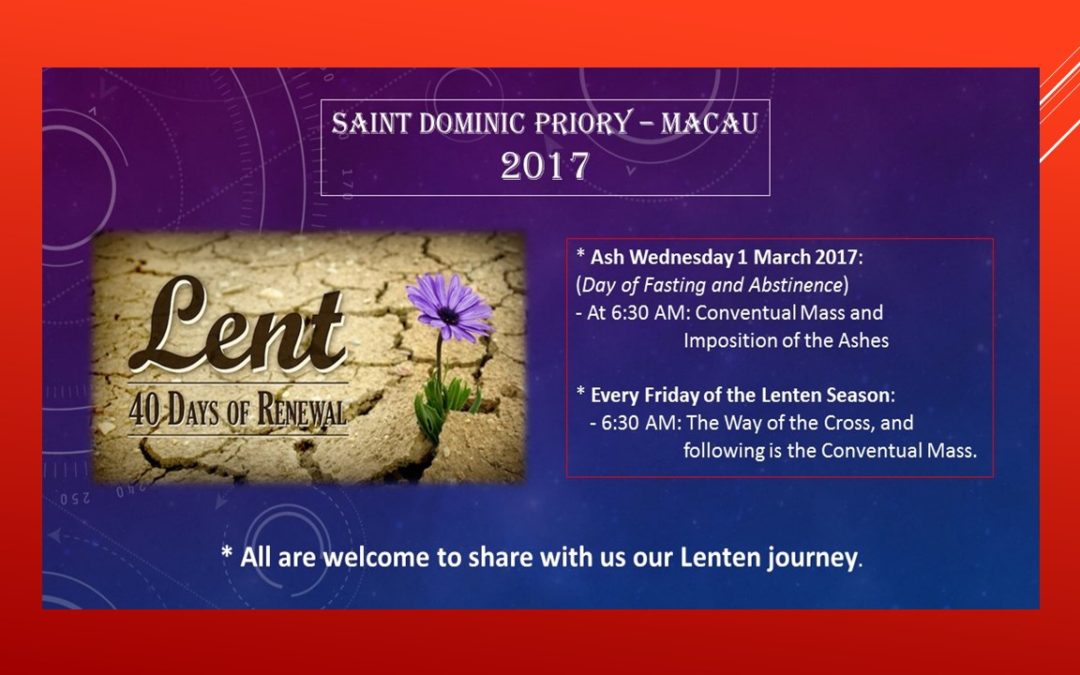
We, the Dominican Brothers of Saint Dominic Priory, would like to invite you to share with us our Lenten journey at our Priory.
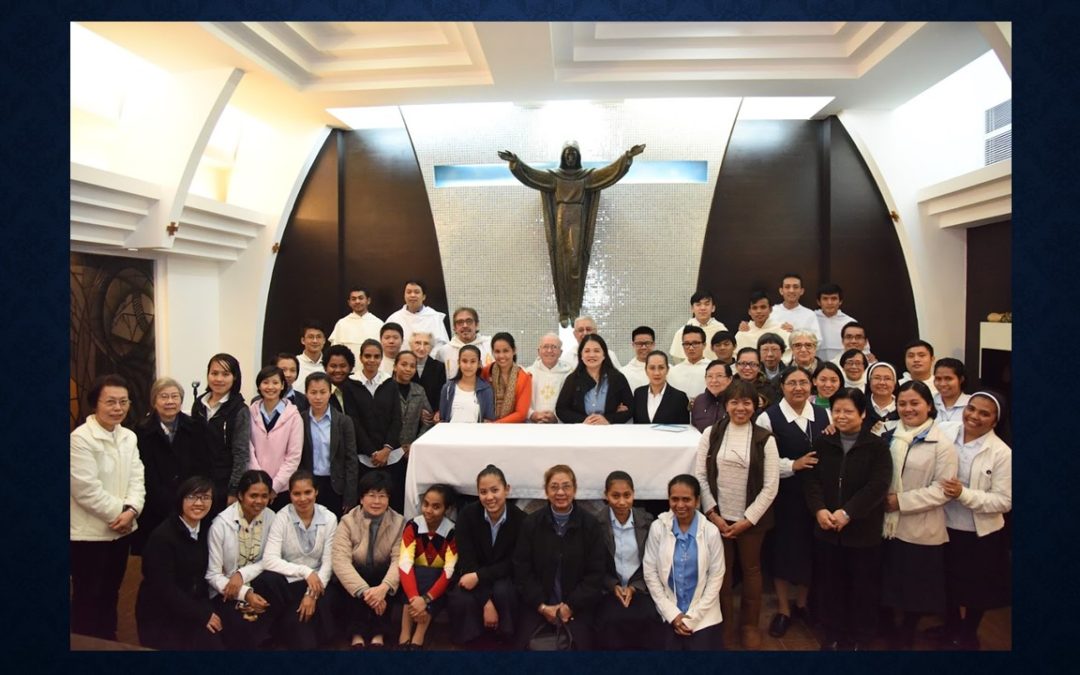
How beautiful on the mountains are the feet of those who bring glad tidings of peace, joy and salvation (Is 52:7)
On 22 December 1216, Pope Honorius III signed the first papal Bull which approved the foundation of St Dominic’s community in Toulouse and took the brethren under papal protection. However, St. Dominic was not fully satisfied with the first approval and asked the Pope for a second Bull that would approve the universality of the Order and in particular its identity name, the then revolutionary name of “Order of Preachers.†On 21 January 1217, St. Dominic received a second Bull from Pope Honorius III that “crowned the first and completed the confirmation of the Order†(www.op.org – Dec 25, 2016). This fact is the reason why the anniversary of the second papal Bull was chosen as the closing date for the Dominican Jubilee 800 that is today, January 21, 2017. This evening, joining all the Dominicans throughout the world, we are gratefully and joyfully and hopefully celebrating with this Solemn Votive Mass of our Father St. Dominic the closing of the Jubilee 800!
It is beautiful to celebrate together as the Dominican Family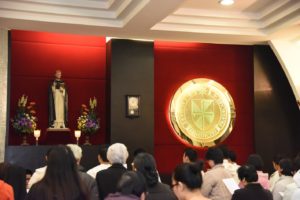 in Macau the closing of the Jubilee. The end closes the curtains of the glorious Dominican Jubilee! Dominic’s adventure of preaching, however, continues! We sisters, brothers and sisters of our lay fraternity continue the awesome adventure of preaching the Good news, of proclaiming the message (II Tim 4:2) – counting always with the permanent presence of Jesus, the Preacher (Mt 28:19-20).
in Macau the closing of the Jubilee. The end closes the curtains of the glorious Dominican Jubilee! Dominic’s adventure of preaching, however, continues! We sisters, brothers and sisters of our lay fraternity continue the awesome adventure of preaching the Good news, of proclaiming the message (II Tim 4:2) – counting always with the permanent presence of Jesus, the Preacher (Mt 28:19-20).
Through the celebration of the Jubilee 800, we Dominicans recalled our birth to rejoice, to give thanks, to be sorry, to renew ourselves, and above all, to revive our passionate love for our unique mission of preaching. Indeed, the Jubilee was a wonderful year to praise God and rejoice: laudare, benedicere et praedicare! Our different activities within the umbrella of the Jubilee 800 were prayerful stops that helped us make of our celebration a path to joyful renewal for each one of us and for our communities. Usually, a simple but significant agape followed our religious or academic celebrations.
The preparation of the Jubilee started officially on November 7 (Feast of All Saints of the Order), 2014 and ended on November 6, 2015. At our St. Dominic’s Priory in Macau, we began to recite the Jubilee Prayer on September 20, 2014 and we end it this evening of January 21, 2017. The daily recitation of the Jubilee Prayer put us on the “Jubilee Mode,†that is, a dynamic process of renewal: “We ask you, Lord, to pour again into us the Spirit of the Risen Lord, that we might faithfully and joyfully proclaim the Gospel of peace.â€
On December 22, 2014, we commemorated together the 798 Anniversary of the first Confirmation of the Order by Pope Honorius III, with the common reading with intermittent songs of Chapter II of the Acts of the Brethren’s General Chapter of Trogir (2013), focused on the charism of preaching and our Dominican style of life.  “Our style of life flows from the personal and communal balancing of study, contemplation, and liturgical prayer, each element enlivening the others.â€
Throughout the year of preparation and the year of celebration of Jubilee 800, the Dominican Family in Macau celebrated also the saints of the Order with the flavor of the Jubilee. A highlight of our Jubilee 800 was the celebration of the Feast of Saint Catherine of Siena. On April 25, 2015, the Dominican brothers of St. Dominic’s Priory went to Taipa to celebrate with our Dominican sisters the Feast of St. Catherine at the sisters’ community of Our Lady of the Rosary. The young Dominican sisters with the assistance of our brothers presented movingly and even passionately the life and works of the great Dominican mystic and apostle, to whom God said: “I Am He Who Is, you are she who is not.â€
The Dominican Family of nuns, brothers, sisters, and lay and priestly fraternities throughout the world opened formally the Jubilee 800 on November 7, 2015, which is – as we all know – the Feast-day of All the Dominican Saints. The Dominican Family in Macau opened the Jubilee’s year-long celebration at the Chapel of St. Dominic Priory with Solemn Evening Prayer. A deeply meaningful part of the Rite of Opening was the Ritual of the Light that is the lighting of a large Dominican Candle which has illumined our chapel up to today – its last day -, January 21, 2017: “As St. Dominic de Guzman enshrined and shared the fire of your love may we, O God, through our preaching and ministry, share that same love with others.â€
Another significant event for all Dominican convents and communities in the world was a Common Lenten Penitential Celebration. The Macau Dominican Family join the Dominican Family of the world with its own Communal Penitential Rite Celebration which was held here on March 21, 2016. For all of us – sinners – this celebration was an act of continuing conversion, which was the main objective of the Jubilee 800 and also of the Jubilee of Mercy the whole Church was then celebrating. We, Preachers of Truth and Preachers of Mercy, remember the words addressed to us then: “Asking for forgiveness and forgiving make the world new every day.â€
Another activity connected with the Jubilee 800 was an outstanding morning lecture on The Dominican Presence in Macau pronounced by Fr. Jarvis Sy, OP on October 1, at 10:00 AM at St. Paul School. It was followed by the celebration of the Mass in honor of St. Therese of the Child Jesus presided over by Bishop Stephen Lee. The relevant words of the first missionaries of the Province of Our Lady of the Rosary come to mind: “We must preach, moreover, through our life style so that if our teaching of the doctrine does not move hearts our lives will move all those who see us: this is the best way of teaching.â€
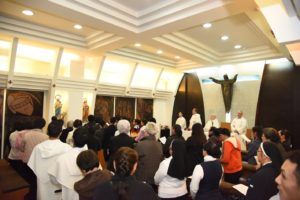 The most solemn celebration of the Jubilee 800 in Macau was the Thanksgiving Mass sponsored by the Province of Our Lady of the Rosary and organized and carried out by Macao’s St. Dominic Priory with the help of our Dominican sisters in Taipa. It took place on the day of the 800 anniversary of the first approval of the Order by Pope Honorius III: December 22, 2016. The place of the grateful celebration gave incredible historical luster and mystery to it: San Domingos Church. The first San Domingos church or chapel was constructed under the supervision of the first three Dominicans, who had arrived in Macau on September 1, 1587; in this place they started their ministry. The Solemn Mass was presided over by Bishop Stephen Lee, with twenty seven priests – mostly Dominicans – concelebrating, and the Dominican sisters, and some other brothers, sisters and lay faithful participating. Fr. Provincial, Javier Gonzalez OP expressed the deep gratitude of the Dominicans to the authorities and people of Macau. One remembers the petition of one of our brothers: “Thank you, Father, for the grace of preaching you bestowed upon us; we reiterate our commitment to live our calling in fidelity and love, in the spirit of our predecessors, of our holy martyrs and confessors; we reaffirm once again our willingness to be sent wherever there is need to serve the people.â€
The most solemn celebration of the Jubilee 800 in Macau was the Thanksgiving Mass sponsored by the Province of Our Lady of the Rosary and organized and carried out by Macao’s St. Dominic Priory with the help of our Dominican sisters in Taipa. It took place on the day of the 800 anniversary of the first approval of the Order by Pope Honorius III: December 22, 2016. The place of the grateful celebration gave incredible historical luster and mystery to it: San Domingos Church. The first San Domingos church or chapel was constructed under the supervision of the first three Dominicans, who had arrived in Macau on September 1, 1587; in this place they started their ministry. The Solemn Mass was presided over by Bishop Stephen Lee, with twenty seven priests – mostly Dominicans – concelebrating, and the Dominican sisters, and some other brothers, sisters and lay faithful participating. Fr. Provincial, Javier Gonzalez OP expressed the deep gratitude of the Dominicans to the authorities and people of Macau. One remembers the petition of one of our brothers: “Thank you, Father, for the grace of preaching you bestowed upon us; we reiterate our commitment to live our calling in fidelity and love, in the spirit of our predecessors, of our holy martyrs and confessors; we reaffirm once again our willingness to be sent wherever there is need to serve the people.â€
Our brother Yves Congar says that Christian tradition may be symbolized by a person walking. Likewise, I suggest, this symbol for our Dominican adventure of preaching today. The person walking – every preacher – has one foot on the ground of the living past, and the other foot in the air, open to change and renewal, and ready to stride forward. When we started our Jubilee journey together, we were told that the Jubilee meant looking at the past with gratitude, embracing the future with hope, and living the present with passion (Pope Francis). Grateful to our glorious past, hopeful towards our future, we try to live our present faithfully, joyfully, and creatively, with passion for Jesus and compassion for all the people, preferentially the oppressed, the poor and the excluded. Saint Paul advises us: “Let us go forward on the road that has brought us to where we are†(Phil 3:16).
The two-year long celebration of the Jubilee 800 has strengthened us and empowered us to go on more determined, more enthusiastic, more fired up: to go on with our marvelous preaching adventure which our Father started. With our Father Dominic’s help (“imple Pater quod dixisti), we continue the adventure. And when it is time to walk through the desert of life, we try not to be discouraged or disheartened: “What makes the desert beautiful is that in some place there is hidden a well of water†(Antoine Saint-Exupery). Like our brothers and sisters through 800 years, like pilgrims with a thousand hopes plus One, you and I are sent: we are sent to proclaim grace and to preach peace! Yes, our journey continues!
How beautiful are the feet of those who proclaim peace and who bring good news (Rom 10:15).
Fray Fausto Gomez OP
St. Dominic Priory
Macau, January 21, 2017
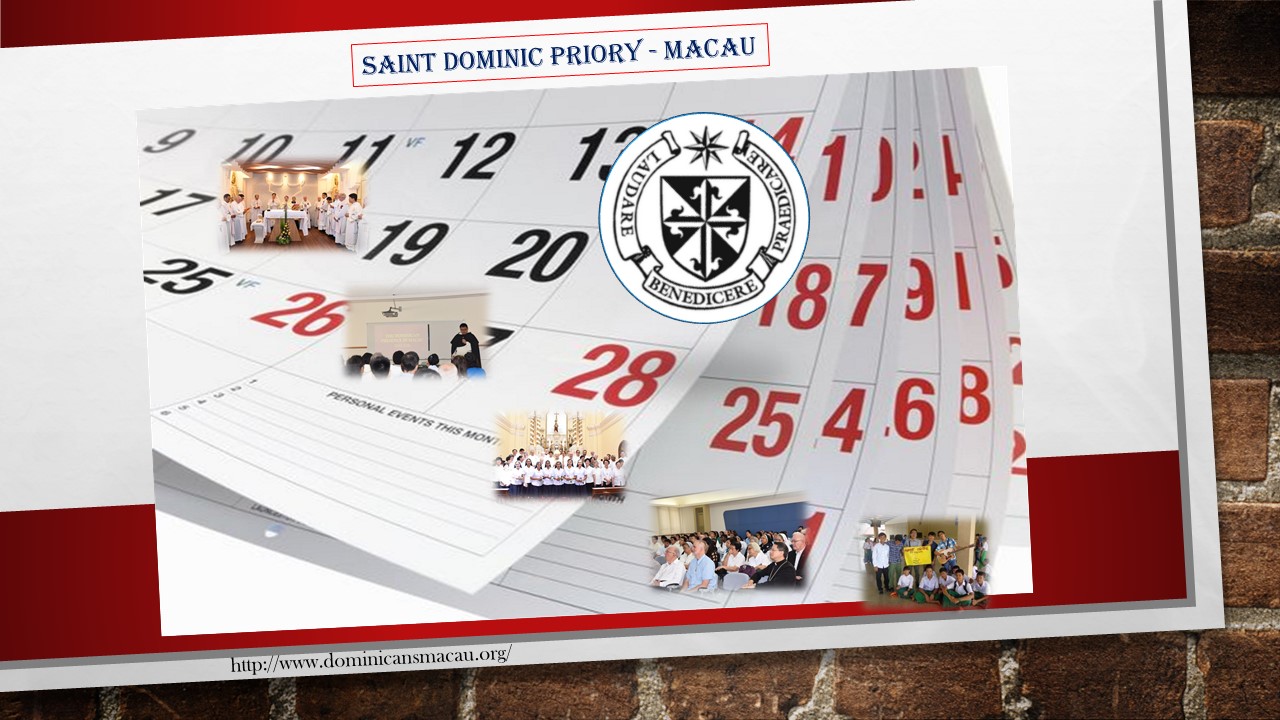
September
On 5 Sep was the Orientation Day for the Faculty of Religious Studies (FRS) of the University of Saint Joseph (USJ). Prof. Arnold Monera gave the Welcome Address while Fr. Franz Gassner, SVD conducted the Orientation for the new students. Bishop Stephen Lee delivered an inspirational message to the staff and students present. The session ended with Closing Prayer and Lunch.
On 20 Sep Pope Francis held an Inter-religious Prayer Meeting at Assisi. The FRS organised a special Prayer Service for Peace to coincide with the pope’s meeting. The service took place in the Saint Joseph Seminary Chapel at 3:00 pm. Fr. Franz Gassner presided over the service while Fr. Peter Stilwell delivered the sharing. Fr. Stilwell is the Rector of USJ.
The first religious profession of seven novices of the Missionary Dominican Sisters of the Rosary took place on 24 Sep at 11:00 am in the Saint Joseph Seminary Chapel. The Mass was presided by His Excellency Stephen Lee, Bishop of Macau. The newly professed are: Nelia Soares Da Silva Pinheriro, Leonarda Da C. Evangelista, Mariana Dos Santos Barreto, Roberta Moniz Soares, Beatrix Thomasia Pias Kahlasi, Maria and Cherropihtun. They are all alumnae of USJ.
October
To commemorate the month of the Rosary, the Priory Chapel displayed the statue of Our Lady of the Visitation of Piat during the whole of October. The statue was brought to Macau from the Philippines. A Rite of Welcome was conducted on 30 Sep at 9:00 pm.
As part of the celebrations of the 800th Jubilee of the Order of Preachers, Saint Dominic’s Priory presented a lecture titled “The Dominican Presence in Macau (1587-1216).†The lecture was delivered by Fr. Jarvis Sy on 1 Oct 2016, 10:00 am at Saint Paul School. A Mass in honour of Saint Theresa of the Child Jesus was celebrated in the school chapel at 11:30 am and it was presided by Bishop Stephen Lee. This was followed by lunch in the school hall.
December
On 1 Dec USJ held its annual Scholarship Awards Ceremony. Br. Francis Nge Nge from our community received a scholarship this year. He is a fourth year student of USJ.
On 2 Dec FRS held its annual Faculty Day. This year the faculty celebrated its 10th anniversary with the theme “A Decade of Commitment to Mission.†In the morning Holy Mass was celebrated at 09:00 am in the Seminary Chapel. Cultural presentations took place at 11:00 am, followed by community lunch at 12:30 pm. In the afternoon parlour games were played at 2:30 pm, followed by sports at 3:00 pm.
On 22 Dec at 5:00 pm in Saint Dominic’s Church, a Thanksgiving Mass was celebrated on the occasion of the 800th anniversary of the confirmation of the Order of Preachers. It was presided by Most Reverend Stephen Lee, Bishop of Macau. A banquet took place after the Mass at 7:15 pm in Hotel Sintra. In attendance were representatives of the entire Dominican family from Hong Kong and Macau, including friars, sisters and laity. The event concluded the celebrations for the Jubilee Year in the province.
Also in December Saint Paul School held its regular end of year celebrations:
On 16 Dec a festive dinner took place at the Fisherman’s Wharf. Staff, students and members of the community attended.
On 22 Dec a morning Mass was celebrated in the school compound. This was followed by the usual Christmas gala.





 in Macau the closing of the Jubilee. The end closes the curtains of the glorious Dominican Jubilee! Dominic’s adventure of preaching, however, continues! We sisters, brothers and sisters of our lay fraternity continue the awesome adventure of preaching the Good news, of proclaiming the message (II Tim 4:2) – counting always with the permanent presence of Jesus, the Preacher (Mt 28:19-20).
in Macau the closing of the Jubilee. The end closes the curtains of the glorious Dominican Jubilee! Dominic’s adventure of preaching, however, continues! We sisters, brothers and sisters of our lay fraternity continue the awesome adventure of preaching the Good news, of proclaiming the message (II Tim 4:2) – counting always with the permanent presence of Jesus, the Preacher (Mt 28:19-20). The most solemn celebration of the Jubilee 800 in Macau was the Thanksgiving Mass sponsored by the Province of Our Lady of the Rosary and organized and carried out by Macao’s St. Dominic Priory with the help of our Dominican sisters in Taipa. It took place on the day of the 800 anniversary of the first approval of the Order by Pope Honorius III: December 22, 2016. The place of the grateful celebration gave incredible historical luster and mystery to it: San Domingos Church. The first San Domingos church or chapel was constructed under the supervision of the first three Dominicans, who had arrived in Macau on September 1, 1587; in this place they started their ministry. The Solemn Mass was presided over by Bishop Stephen Lee, with twenty seven priests – mostly Dominicans – concelebrating, and the Dominican sisters, and some other brothers, sisters and lay faithful participating. Fr. Provincial, Javier Gonzalez OP expressed the deep gratitude of the Dominicans to the authorities and people of Macau. One remembers the petition of one of our brothers: “Thank you, Father, for the grace of preaching you bestowed upon us; we reiterate our commitment to live our calling in fidelity and love, in the spirit of our predecessors, of our holy martyrs and confessors; we reaffirm once again our willingness to be sent wherever there is need to serve the people.â€
The most solemn celebration of the Jubilee 800 in Macau was the Thanksgiving Mass sponsored by the Province of Our Lady of the Rosary and organized and carried out by Macao’s St. Dominic Priory with the help of our Dominican sisters in Taipa. It took place on the day of the 800 anniversary of the first approval of the Order by Pope Honorius III: December 22, 2016. The place of the grateful celebration gave incredible historical luster and mystery to it: San Domingos Church. The first San Domingos church or chapel was constructed under the supervision of the first three Dominicans, who had arrived in Macau on September 1, 1587; in this place they started their ministry. The Solemn Mass was presided over by Bishop Stephen Lee, with twenty seven priests – mostly Dominicans – concelebrating, and the Dominican sisters, and some other brothers, sisters and lay faithful participating. Fr. Provincial, Javier Gonzalez OP expressed the deep gratitude of the Dominicans to the authorities and people of Macau. One remembers the petition of one of our brothers: “Thank you, Father, for the grace of preaching you bestowed upon us; we reiterate our commitment to live our calling in fidelity and love, in the spirit of our predecessors, of our holy martyrs and confessors; we reaffirm once again our willingness to be sent wherever there is need to serve the people.â€